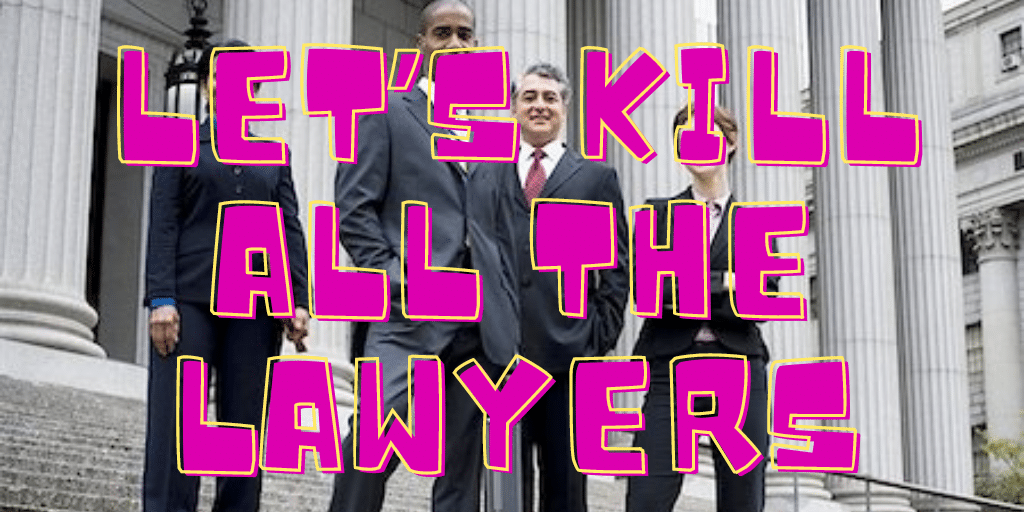The phrase “Let’s kill all the lawyers” is often quoted out of context, contributing to its frequent misinterpretation. Contrary to its literal interpretation, the line, spoken by Dick the Butcher in William Shakespeare’s play Henry VI, Part 2, does not advocate violence against legal professionals. Instead, it is a satirical remark that underscores the importance of lawyers in upholding justice and maintaining order in society. The full context of the line is crucial for understanding its intended meaning.
Origin of “Let’s Kill All The Lawyers”
In Act IV, Scene II of Henry VI, Part 2, Dick the Butcher utters the line during a rebellion led by Jack Cade. The full quote is:
“The first thing we do, let’s kill all the lawyers.”
Cade, a pretender to the throne, hopes to destabilize the existing social order, and the line serves as a tongue-in-cheek recognition that lawyers, by upholding the law and administering justice, are impediments to anarchy. In the context of the play, the line highlights the subversive nature of Cade’s rebellion and the chaos that ensues when legal structures are undermined.

Let’s kill all the lawyers
Appearances in Literature and Other Media
Over the centuries, Shakespeare’s phrase has made its way into various works of literature, popular culture, and even legal discourse.
- Literature:
- Charles Dickens referenced the line in “Bleak House,” where a character states, “Let us be moral, let us contemplate existence. It turns out that the first person who brought an action for breach of promise was an action brought by a lawyer on his own behalf. Let us be moral. And the first person who brought an action for defamation was an attorney or solicitor. Let us be moral. … ‘Let us kill all the lawyers’ said the red little man. What’s Shakespeare compared to that!”
- Film:
- The phrase has appeared in various films, including “The Pirates of Penzance” (1983), where it is humorously referenced, emphasizing its enduring cultural presence.
- Television:
- In the television series “The Simpsons,” the line is parodied when Sideshow Bob, after being elected as the mayor of Springfield, declares, “And to help you relax, I’ve hired Kenny G to play smooth jazz during all working hours. We’re going to keep our lawyers on staff, and we’re not going to kill all the lawyers!”
Famous Uses in History
While the line has been occasionally used in history to make political or satirical points, it is crucial to note that these instances do not involve any actual harm to lawyers. Rather, they employ the phrase as a rhetorical device to comment on legal issues or societal concerns.
- Watergate Scandal:
- During the Watergate scandal in the 1970s, President Richard Nixon’s counsel, John Dean, used a variation of the line in testimony before the Senate Watergate Committee. Dean stated, “I began by telling the president that there was a cancer growing on the presidency, and if the cancer was not removed, the president himself would be killed by it. I also told him that it was important that this cancer be removed immediately because it was growing more deadly every day. I did not then know that this operation, the White House Plumbers, was in existence.”
- Legal Opinions:
- In legal opinions, judges have occasionally referenced the line for its literary value. However, these references are not indicative of any actual hostility towards lawyers.
Modern Applications
In contemporary contexts, the phrase is often invoked for its humour and as a nod to Shakespearean wit rather than as a serious call to action.
- Legal Conferences and Events:
- The line has been humorously incorporated into legal conferences, seminars, and events. It is often used to bring a lighthearted touch to discussions about legal matters.
- Political Satire:
- Politicians and satirists occasionally use the phrase to make light of legal or political situations. Its humorous undertone allows it to be employed without promoting violence but rather as a commentary on the complexities of legal systems.
In conclusion, Shakespeare’s “Let’s kill all the lawyers” has transcended its original context in “Henry VI, Part 2” to become a widely quoted and often misinterpreted phrase. Its enduring presence in literature, media, and historical references showcases its versatility as a tool for satire, commentary, and humour. While the line may have historical instances where it was invoked for rhetorical effect, it is crucial to understand its intended meaning within the context of Shakespeare’s play and appreciate its enduring cultural impact.




Leave a Reply
Want to join the discussion?Feel free to contribute!